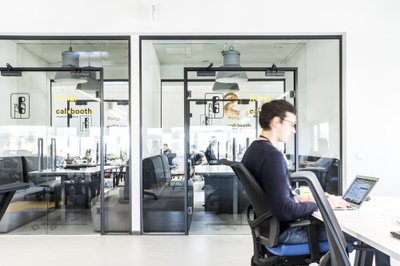Returning expatriates to the labour market is one of Lithuania’s top priorities. However, in order for expatriate Lithuanians to choose to continue their careers in their homeland, it is crucial to create favourable working and learning conditions and integration opportunities, not only for them but also for their family members. Therefore, the Ministry of Economy and Innovation, together with partners, is implementing the Diaspora-Friendly Employer initiative, the goal of which is to meet the needs of the diaspora and employers, encouraging diaspora representatives to choose further career opportunities in Lithuania and employers to hire Lithuanians living abroad or intending to return while they are still abroad.
„Diaspora-Friendly Employers play a particularly important role in strengthening the Lithuanian economy. Their openness to talent from abroad promotes innovation and competitiveness, and every returning or arriving specialist helps strengthen our business environment and creates added value for Lithuania,“ said Aušrinė Armonaitė, Minister of Economy and Innovation.

More advantages than disadvantages
The team of the Lithuanian startup TransferGo knows very well what it means to work in a company where borders do not exist. The company employs more than 400 people, has offices in three countries, and its employees communicate with each other in more than 10 different languages. The company’s head of communications Vilma Radzevičienė is happy that their team is increasingly being supplemented by colleagues who have returned from abroad. All of them are highly qualified specialists.
The fact that the number of Lithuanians who not only want to build their lives and professional future in Lithuania but also actually return, is consistently growing, is also noted by Božena Petikonis-Šabanienė, HR manager at Ignitis Renewables. This is especially evident in recent years with job positions, which were previously only available abroad, now available in Lithuania. According to the interviewee, employees who have returned from abroad currently make up approximately 10% of all employees in the company.

Although some employers still view employees who have returned from abroad after a longer period of time with scepticism, both interviewees see more advantages than disadvantages: those who have worked in similar jobs abroad return with new knowledge, skills, and experience, which they successfully apply here in Lithuania.
„Returning employees often have a broader worldview, a more diverse experience, and the ability to adapt to various working conditions. One of their main advantages is global work experience, which is not limited to local standards. They have often seen other business models, cultures, and working methods, which allow them to be innovative and offer new ideas. In addition, such employees are usually more tolerant and able to communicate more easily with representatives of different nationalities and cultures. Therefore, employers, recognising these advantages, can make excellent use of their accumulated experience and contribute to the growth and development of the organisation,“ added Petikonis-Šabanienė.

„We perceive the diversity of talents working in a company as a huge advantage, especially when the company is expanding into new markets or creating product innovations. Specialists who have grown up, studied, or worked in different countries contribute with their international experience, knowledge, and insights, and complement the company’s culture with new behavioural models. „This way, we accelerate the creation of innovations, make more informed decisions when entering new markets, respond to global customer needs with better quality, and better understand the cultural differences of the countries in which we provide services,“ continued Radzevičienė.
Returning to Lithuania is brought on by different motives, but the dissipation of stereotypes causes surprise
The HR manager at Ignitis Renewables says that she has repeatedly heard good feedback from returning employees about positive changes in the work culture in Lithuania, which are on par with Western and Scandinavian work cultures. However, anxiety about integration and adaptation still remains one of the biggest challenges for both employers and returning employees.
„The characteristics of the labour market in Lithuania may differ from foreign countries, so sometimes expectations may not match the reality. For example, the salary in our country is lower if we compare it with the average salaries in the United Kingdom or Germany, but we also need to consider that the cost of living also differs. It is easier to purchase real estate in our country, and we are a smaller country, so the distances and layout of cities help to achieve a better work-life balance. Lithuania really has a lot to offer, so those considering the possibility of returning should take a broader approach,“ advised Petikonis-Šabanienė.
The head of communications at TransferGo says that their employees are motivated to return by very different things: some are inspired by the summers spent in Lithuania during the quarantine period, others by the desire to actively engage in the country’s cultural life or join the Riflemen’s Union, while others said they always knew they were only leaving for a short time. There are also some envious people in the team when top-level managers, who have built their lives in a foreign country for many years, decide to return to their homeland and continue their careers here, in the same company.

„I am glad that colleagues who have returned from foreign countries see positive changes. Although there are cultural differences, they are not as pronounced as they were 10 or more years ago. Some notice that there is still a considerable burden of bureaucracy in Lithuania, and it is necessary to re-establish a circle of professional contacts, restore relationships with old friends, and devote time to making new friendships. However, most people are surprised by how much Lithuanian business culture has changed, and often stereotypes that existed in the past are not confirmed, but quite the opposite – people feel an especially good balance between work and quality of life,“ said Radzevičienė.
Fears that still hold back employers
Although most employers are currently flexible in their assessment of Lithuanians returning from abroad and consider them experienced and necessary specialists, certain fears still exist. As Petikonis-Šabanienė notes, they are usually related to higher expectations for working conditions and salaries that diaspora candidates may have, taking into account their experience abroad.
„Some companies may believe that such employees demand excessive financial compensation, which does not always correspond to the company’s capabilities. However, this can be resolved through open dialogue and adjustment of expectations. It is very important to emphasise that companies that engage in this dialogue and are ready to discuss working conditions and career opportunities can often offer such advantages that are evaluated not only through a financial prism. „Qualified and experienced diaspora candidates can bring valuable experience that will pay off in the long run, and investing in their return can be strategically beneficial for both companies and employees,“ said the HR manager at Ignitis Renewables.
Employers also often believe that compatriots who have worked abroad for a longer period of time will raise uncomfortable questions and question the company’s processes because they will constantly compare their current experience with their previous experience abroad. However, according to the interviewee, change and forward movement occur only by critically reviewing the existing process, so uncomfortable questions are an excellent tool for business and organisational development.
Radzevičienė added that assessing potential candidates and existing employees through migration experience is not entirely appropriate.
„It is extremely important to be able to assess all candidates according to their real skills and experience and not according to their place of residence, age, gender, culture, or other criteria. It is also necessary to understand the different business contexts and cultures of the countries in which the specialists worked. The benefits of talent diversity for fast-growing companies are not only a fact confirmed by scientific research; a team with international experience can become a key success factor in creating innovations or growing rapidly in new markets,“ added the head of communications at TransferGo.

Many employers are diaspora-friendly but don’t realise it
Lithuania is home to international companies, Western work culture is becoming the norm, and wages are growing faster than in any other OECD country. The startup ecosystem is thriving, and many companies were founded by returning Lithuanians who took advantage of excellent acceleration and funding opportunities.
In order to attract talent and facilitate the integration of returning Lithuanians into the labour market, a Diaspora-Friendly Employer badge was created. The goal of this badge is to dispel existing myths and encourage the inclusion of foreign Lithuanians in the Lithuanian labour market, as well as motivate business representatives to employ returning compatriots. This initiative was implemented by the Ministry of Economy and Innovation, the Employment Service under the Ministry of Social Security and Labour, as well as the Global Lithuanian Leaders and the Lithuanian World Community.
Companies wishing to receive a Diaspora-Friendly Employer badge must meet at least three of the five following criteria:
Job selections are conducted remotely and/or remote workplaces are established by the company (employers announce remote work opportunities on their websites).
There’s an intercultural and inclusive work atmosphere (the company has an internal document declaring openness to cultures, equal rights, and other progressive provisions).
Communication (both internal and external) is carried out in English. Job advertisements are published in both Lithuanian and English.
The employer has a clearly defined onboarding process for new employees, including a mentoring system and an information package.
There’s a flexible process for signing employment contracts and agreeing on a start date.
The Diaspora-Friendly Employer initiative is based on the principles of trust and openness and is not bureaucratically regulated. Employers only need to fill out a special declaration form, which can be found on the Employment Service website, and demonstrate compliance with the specified criteria, and then they will receive a Diaspora-Friendly Employer badge, which is displayed next to the job advertisements published by the employer and/or can be used as a communication and marketing tool to attract employees.
